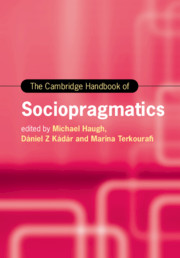Book contents
- The Cambridge Handbook of Sociopragmatics
- Cambridge Handbooks in Language and Linguistics
- The Cambridge Handbook of Sociopragmatics
- Copyright page
- Contents
- Figures
- Tables
- Contributors
- Acknowledgements
- 1 Introduction
- Part I Fundamentals of Sociopragmatics
- Part II Topics and Settings in Sociopragmatics
- 13 Face, Facework and Face-Threatening Acts
- 14 Relationships and Relating
- 15 Analysing Identity
- 16 (Im)politeness and Sociopragmatics
- 17 Affect and Emotion
- 18 Power
- 19 Morality in Sociopragmatics
- 20 Conversational Humour
- 21 Gesture and Prosody in Multimodal Communication
- 22 Digitally Mediated Communication
- 23 Workplace and Institutional Discourse
- 24 Service Encounter Discourse
- 25 Argumentative, Political and Legal Discourse
- 26 The Pragmatics of Translation
- Part III Approaches and Methods in Sociopragmatics
- Index
- References
23 - Workplace and Institutional Discourse
from Part II - Topics and Settings in Sociopragmatics
Published online by Cambridge University Press: 01 April 2021
- The Cambridge Handbook of Sociopragmatics
- Cambridge Handbooks in Language and Linguistics
- The Cambridge Handbook of Sociopragmatics
- Copyright page
- Contents
- Figures
- Tables
- Contributors
- Acknowledgements
- 1 Introduction
- Part I Fundamentals of Sociopragmatics
- Part II Topics and Settings in Sociopragmatics
- 13 Face, Facework and Face-Threatening Acts
- 14 Relationships and Relating
- 15 Analysing Identity
- 16 (Im)politeness and Sociopragmatics
- 17 Affect and Emotion
- 18 Power
- 19 Morality in Sociopragmatics
- 20 Conversational Humour
- 21 Gesture and Prosody in Multimodal Communication
- 22 Digitally Mediated Communication
- 23 Workplace and Institutional Discourse
- 24 Service Encounter Discourse
- 25 Argumentative, Political and Legal Discourse
- 26 The Pragmatics of Translation
- Part III Approaches and Methods in Sociopragmatics
- Index
- References
Summary
Language use in the workplace setting has become an increasingly popular area of research within sociolinguistics. The original focus of analysis was conversations between professionals and laypeople (institutional talk), quickly extending to interactions between colleagues in their everyday workplace talk (workplace discourse). The major interest throughout this expansion can be summed up as the intersection between power and politeness. In line with wider developments in pragmatics, analyses adopting a (revised) Brown and Levinsonian approach are now outnumbered by interactional and discursive approaches to politeness and, more recently, impoliteness. In parallel with theoretical advances, the research agenda has moved from the enactment of speech acts at the level of utterance (notably directives, disagreements and aspects of meeting management) to the impact of interactional context/s (especially the workplace Community of Practice) and the role of wider discourses in the negotiation of meaning making between interactants. A focus on metapragmatics and ideologies extends these concepts even further, offering the opportunity for more nuanced reflections on sociopragmatic issues. The discussion is illustrated by analyses from workplace discourse scholars, including examples from our own research carried out over the past twenty years.
- Type
- Chapter
- Information
- The Cambridge Handbook of Sociopragmatics , pp. 475 - 495Publisher: Cambridge University PressPrint publication year: 2021

